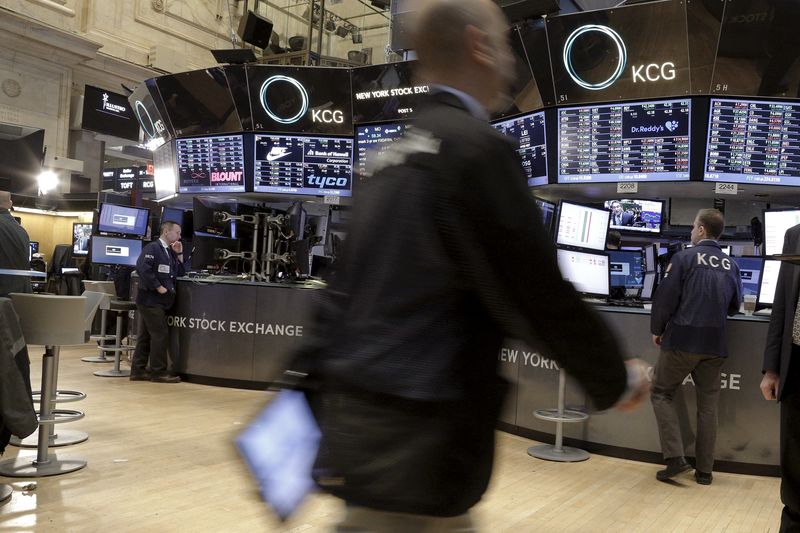
© Reuters.
By Geoffrey Smith
Investing.com — Russian forces are on the move again in Ukraine after being bogged down for a week. The humanitarian disaster there escalates, with the number of refugees now estimated at over 2.4 million. Oil jumps as talks to lift sanctions on Iran are paused, frustrating hopes for a quick increase in supplies of Iranian crude. Rivian stumbles after revising down its production guidance for this year. Chinese technology stocks are on course for their worst week in a year on revived fears of forced delistings from U.S. markets, and the company behind nickel’s big short says it wants to keep the position open. Here’s what you need to know in financial markets on Friday, 11th March.
1. Summit “possible” but Russian war machine cranks up again
The Kremlin said a meeting between President Vladimir Putin and Ukraine’s President Volodymyr Zelensky is possible, raising hopes of a diplomatic resolution to a war that is now in its third week. Such hopes had taken a knock on Thursday after a meeting between the two countries’ foreign ministers broke up without visible progress.
Elsewhere, EU leaders called for a full withdrawal of Russian forces from Ukraine, setting a high bar for anything resembling a lifting of economic pressure on Russia. It also promised another 500 million euros ($555 million) in military assistance for Ukraine.
On the battlefield, Russia stepped up airstrikes on western Ukraine, and its 40-mile long convoy that had been stuck north of Kyiv for the last week started moving again, dividing into two in what analysts said may be a prelude to an attack on the capital. Putin said he would deploy volunteers from Syria to fight in response to reports of foreign citizens seeking to join Ukrainian forces.
The humanitarian disaster in Ukraine’s other cities continued, with the residents of Mariupol having to dispose of their dead in mass graves, while Russian artillery – which targeted a maternity unit earlier this week – struck a psychiatric hospital, according to Ukrainian officials. The UNHCR estimates that some 2.4 million refugees have now fled the country, the biggest such movement in Europe since World War 2.
2. Oil jumps as Iran talks paused
Oil prices rose as the talks around lifting sanctions on Iran were paused followed by concerns in Western capitals, especially Washington, that the concessions offered on its nuclear program are too high a price to pay for an increase in supplies of Iranian oil to world markets.
The Biden administration has also sounded out Venezuela this week on ways to increase its supplies. Of more immediate concern, unwillingness – or inability – of U.S. shale companies to increase production, despite record-high prices. Baker Hughes’ rig count, which measures U.S. drilling activity, is due later.
By 6:30 AM ET (1130 GMT), U.S. crude futures were up 2.0% at $108.43 a barrel, while Brent futures were up 2.3% at $111.84 a barrel.
3. Stocks set to open higher; Rivian in spotlight
U.S. stock markets are set to open higher Friday, in line with gains made in Europe on fresh hopes for diplomatic progress to the conflict.
By 6:15 AM ET, Dow Jones futures were up 387 points, or 1.2%, while S&P 500 futures were up 1.4% and Nasdaq 100 futures were up 1.6%.
Stocks likely to be in focus later include EV-maker Rivian, which announced a wider loss in the fourth quarter and was forced to lower its production guidance for the year late on Thursday. Oracle (NYSE:ORCL) stock is also lower in premarket after its third-quarter earnings missed forecasts due to higher operating costs and a weak performance by its equity investments.
Also in focus will be Meta Platforms (NASDAQ:FB) after news suggesting it will allow calls for violence against Russian officials and armed forces on its social media platforms, in breach of its usual policies.
4. Chinese tech stock selloff deepens after SEC warning
Chinese technology stocks are on course for their worst week in a year, after a notice from the Securities and Exchanges Commission on Thursday revived fears that they may be forced to delist from U.S. stock markets.
The SEC said ACM Research (NASDAQ:ACMR), fast-food giant Yum China, BeiGene (NASDAQ:BGNE), Zai Lab (NASDAQ:ZLAB) and HutchMed all risked being delisted in early 2024 unless they presented proper audit documents supporting their financial statements.
The NASDAQ Golden Dragon China index, which tracks Chinese ADRs, fell 10% on Thursday, with individual names such as Nio (NYSE:NIO), Alibaba (NYSE:BABA) and Pinduoduo (NASDAQ:PDD) losing between 8% and 20%. The index is now down some 68% from its high in February last year.
Back in China meanwhile, officially registered new cases of Covid-19 breached 1,000 for the first time in two years. China’s Prime Minister Li Keqiang also again expressed concern about Western sanctions on Russia, which look increasingly likely to cause a sharp slowdown in the world economy.
5. Nickel’s big short wants to keep his position open
The London Metal Exchange Index said nickel trading will stay suspended through the end of the week as it struggles to deal with the backlash against its moves to protect its members.
Tsangshin, the Chinese company whose massive short position was the root cause of the spike that forced the LME to suspend trading, said it wants to keep the position open, which may be just as well given that there is no agreement over what price it can be closed.
Other base metals continued to push higher Friday amid continued uncertainty over the status of Russian supply. The chairman of mining giant Norilsk Nickel, Vladimir Potanin, warned that Russia’s current policies would take it back to 1917 – the year of the Bolshevik revolution.
Source: Investing.com




























